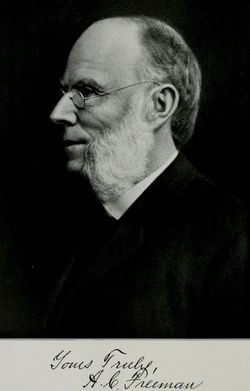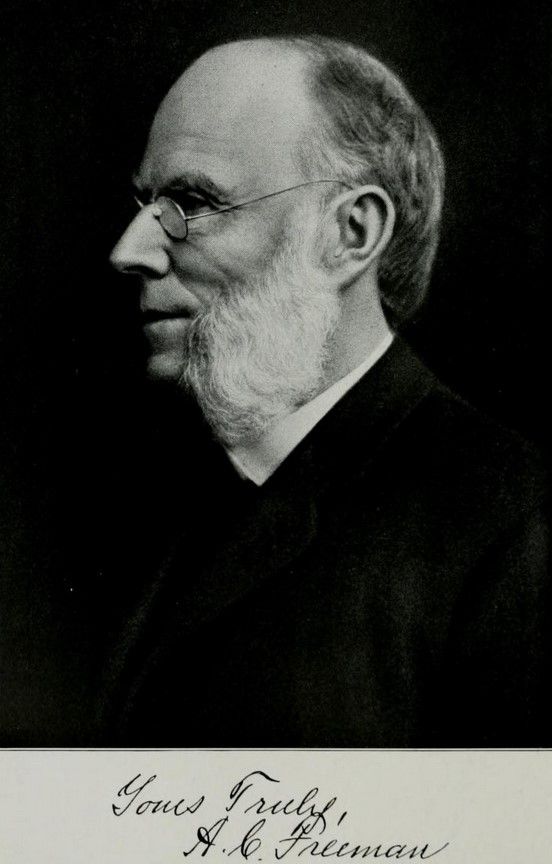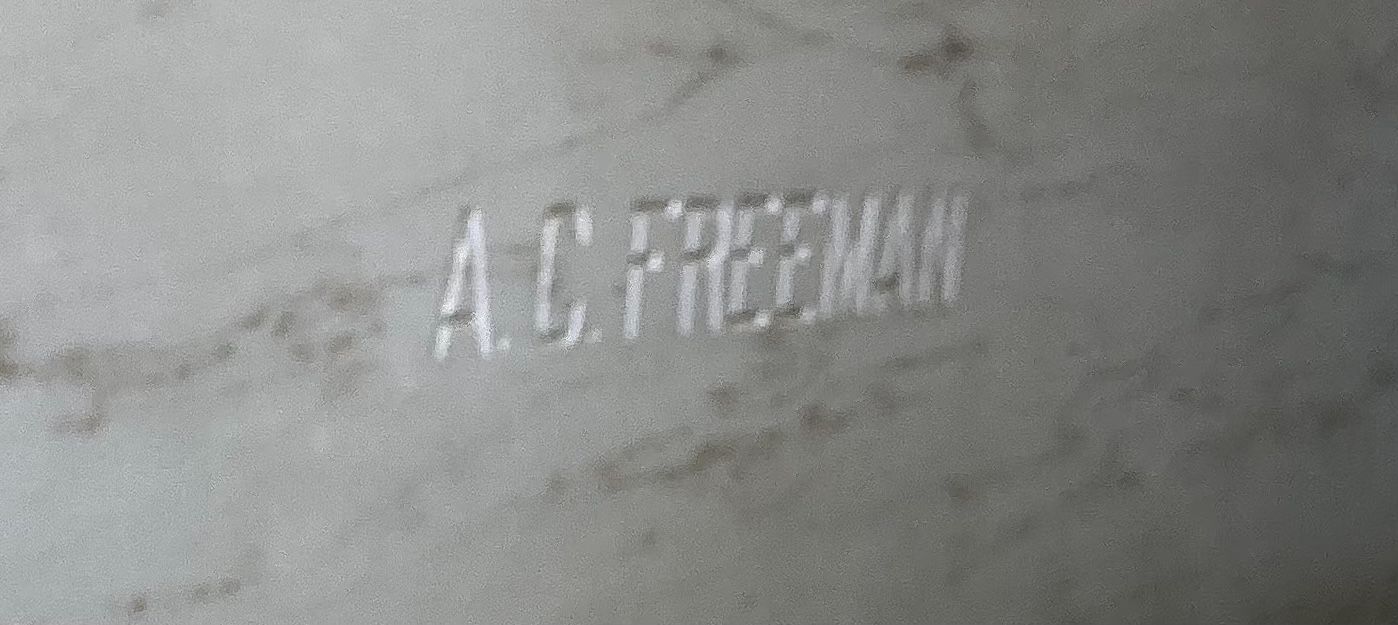He was born in Hancock County, Illinois, May 15, 1843, and died April 11, 1911. He was a son of Obadiah S. and Nancy (Clark) Freeman, and a grandson of John and Harriet (Alston) Freeman. His mother was a descendant of Abraham Clark, one of the signers of the Declaration of Independence.
His early advantages were those of the district schools in Southern Illinois. At the age of seventeen he was given a license to teach school in California. In September, 1861, he accompanied his father to California. The family located at Elk Grove. A.C. Freeman taught a district school in San Joaquin County during 1861-62. He also worked on his father's farm.
In September, 1863 he entered the law office of Morris M. Estee, then district attorney of Sacramento County. He had long cherished an ambition for the law and had done much private study in that direction. He was therefore able to pass the examination before the Supreme Court in July, 1864, and was only a few weeks just the age of twenty-one when he was admitted to practice. However, he remained with Mr. Estee two years and four years under James C. Goods, improving these exceptional opportunities for study and experience. He practiced for a time as partner of Thomas H. Clunie, and in 1872 formed a partnership with J. H. Alexander, one of the Superior Court judges. In 1879 he formed a partnership with Mr. Bates, and in November 1886, they removed their law offices to San Francisco. For many years he looked after a large and important clientage. He was a man of phenomenal industry, loving work for work's sake and particularly as a law editor his industry and enthusiasm did not fail until the last few weeks of his life. He displayed an unsurpassed genius as a legal editor.
His first volume, published in 1873, was on the "Law of Judgments" and was the first national treatise written or published in California. Of it the American Law Review said:
"It seems impossible for a young lawyer to have composed so good a book in so good a manner; yet it seems almost impossible that, if old in law, so able a lawyer should not long since have become familiar to the profession everywhere; and we confess to a painful doubt lest he turn out to be some eminent barrister whom not to know is only to confess our own ignorance."
He was author of "Cotenancy and Partition," published in 1874, "Executions," published in 1876, "Void Judicial States," published in 1877. As a member of the Constitutional Convention of 1878-79 he took an active part in framing the new constitution and was a member of the committee appointed by the governor to propose such amendments as were required to harmonize the codes of the state with its new constitution. He was member and president of the com- mission to revise and reform the laws of California from 1899 to April 30, 1903.
The greatest volume of his work as a law editor was accomplished while editor of the American Decisions, a post he assumed in 1879, and of American State Reports, which he began in 1888.
One concise tribute to his labors is:
"He gave the best that was in him for the promotion and dissemination of the condensed legal ideas with which his wonderfully quick and direct brain was so familiar. His work has, as it were, radiated from him apparently without effort. The most knotty legal problem was solved in his unique and direct manner, which still further strengthened the likeness to Abraham Lincoln. But it is mainly with regard to his legal works that we speak of his as a great public servant. From the time when he commenced his publications — his monumental work on Judgments, which ran through four editions from 1873 to 1872, than which we venture to say no work is better known throughout the whole continent, his work on Executions in civil cases, which he produced in three editions between 1876 and 1891, his earlier work on Cotenancy and Partition, which was produced in 1874, with a second edition in 1886, his splendid contribution on the subject of Partition to the thirtieth volume of the 'Cyc' — all through these works run the undoubted mark of his peculiar ability. Strong in seizing his facts, stronger in discrimination, he was at his best in that keen analysis which never failed him in dissecting his legal subjects with almost surgical delight, and his judgment was unfailing; we are nearly justified in saying that his judgment was unerring. The works we have mentioned, great in themselves and in their service to the profession, appear puny and insignificant beside the colossal work upon which he had been engaged for the past twenty-five years. His name will go down to posterity forever coupled with the editorship of the trinity series of reports, the American Decisions, the American Reports and the American State Reports. In 1886, when on the death of Mr. Proffatt, he assumed the chair of American Decisions, then in their twelfth volume, his modesty made it apparent that he entered upon the great work with an amount of diffidence that might well have become a less learned man."
Speaking of his work in the American Decisions and State Reports, the American Law Review says:
"It is our deliberate judgment that if this enormous mass of annotations, written in careful text-book form, built with skill and patient diligence, were collected, arranged and printed in the form of an abridgment, no similar publication could hold the field. Mr. Freeman, however, disdained the idea of producing a separate encyclopedia of law. His aim was unique. By combining his commentaries with a fine selection of cases, drawn from every state in the Union, he produced an original and unified system, the benefits of which will be lasting. Mr. Freeman's life has been essentially an intellectual one. He has looked upon stirring scenes and stood in the midst of the dissensions of men, but his dispassionate nature and the dominance of his intellectual faculties kept him from assuming any conspicuous place of activity in the turmoils he witnessed. He was a striking type of self-made man. Neither so exceedingly lowly in his origin nor so exalted in future life as Abraham Lincoln, he was unmistakably of the same stuff, born in the same state and, like his great prototype, he had his way to win in the world, with little besides a rugged frame and stubborn will and clear brain and an honest conscience."
Achievements that associate his name and reputation permanently with the literature of American law were not incompatible with the leisure to cultivate friendship and enjoy the pleasures of home. Mr. Freeman is survived by Mrs. Freeman, whose home is at 3301 Washington Street, San Francisco. They were married at Elk Grove, California, September 17, 1867. Before her marriage Mrs. Freeman was Miss Josephine B. Foulks, daughter of Alfred and Euphemia (Pugh) Foulks, her father a native of Pennsylvania and her mother of Ohio. Mrs. Freeman is of Holland-Dutch and English descent on the paternal side, and Welsh in the maternal line. Her grandfather, George Foulks, was a native of Virginia, moving from that state to Pennsylvania. Her maternal grandfather, Jonathan Pugh, was also a native of Virginia, a son of John Pugh, who came from Wales. Her father was a merchant in Ohio until his death. Mrs. Freeman was an infant when her father died, and in 1853 she accompanied her mother across the plains to California, being six months on the way. She was reared and educated at Elk Grove, where she lived until her marriage. Mr. and Mrs. Freeman had one daughter, Mabel V., the wife of Benjamin Romaine, of San Francisco.
- "The San Francisco Bay Region, Vol. 3" by Bailey Millard; Published by The American Historical Society, Inc., 1924
(Courtesy member 49423547)
He was born in Hancock County, Illinois, May 15, 1843, and died April 11, 1911. He was a son of Obadiah S. and Nancy (Clark) Freeman, and a grandson of John and Harriet (Alston) Freeman. His mother was a descendant of Abraham Clark, one of the signers of the Declaration of Independence.
His early advantages were those of the district schools in Southern Illinois. At the age of seventeen he was given a license to teach school in California. In September, 1861, he accompanied his father to California. The family located at Elk Grove. A.C. Freeman taught a district school in San Joaquin County during 1861-62. He also worked on his father's farm.
In September, 1863 he entered the law office of Morris M. Estee, then district attorney of Sacramento County. He had long cherished an ambition for the law and had done much private study in that direction. He was therefore able to pass the examination before the Supreme Court in July, 1864, and was only a few weeks just the age of twenty-one when he was admitted to practice. However, he remained with Mr. Estee two years and four years under James C. Goods, improving these exceptional opportunities for study and experience. He practiced for a time as partner of Thomas H. Clunie, and in 1872 formed a partnership with J. H. Alexander, one of the Superior Court judges. In 1879 he formed a partnership with Mr. Bates, and in November 1886, they removed their law offices to San Francisco. For many years he looked after a large and important clientage. He was a man of phenomenal industry, loving work for work's sake and particularly as a law editor his industry and enthusiasm did not fail until the last few weeks of his life. He displayed an unsurpassed genius as a legal editor.
His first volume, published in 1873, was on the "Law of Judgments" and was the first national treatise written or published in California. Of it the American Law Review said:
"It seems impossible for a young lawyer to have composed so good a book in so good a manner; yet it seems almost impossible that, if old in law, so able a lawyer should not long since have become familiar to the profession everywhere; and we confess to a painful doubt lest he turn out to be some eminent barrister whom not to know is only to confess our own ignorance."
He was author of "Cotenancy and Partition," published in 1874, "Executions," published in 1876, "Void Judicial States," published in 1877. As a member of the Constitutional Convention of 1878-79 he took an active part in framing the new constitution and was a member of the committee appointed by the governor to propose such amendments as were required to harmonize the codes of the state with its new constitution. He was member and president of the com- mission to revise and reform the laws of California from 1899 to April 30, 1903.
The greatest volume of his work as a law editor was accomplished while editor of the American Decisions, a post he assumed in 1879, and of American State Reports, which he began in 1888.
One concise tribute to his labors is:
"He gave the best that was in him for the promotion and dissemination of the condensed legal ideas with which his wonderfully quick and direct brain was so familiar. His work has, as it were, radiated from him apparently without effort. The most knotty legal problem was solved in his unique and direct manner, which still further strengthened the likeness to Abraham Lincoln. But it is mainly with regard to his legal works that we speak of his as a great public servant. From the time when he commenced his publications — his monumental work on Judgments, which ran through four editions from 1873 to 1872, than which we venture to say no work is better known throughout the whole continent, his work on Executions in civil cases, which he produced in three editions between 1876 and 1891, his earlier work on Cotenancy and Partition, which was produced in 1874, with a second edition in 1886, his splendid contribution on the subject of Partition to the thirtieth volume of the 'Cyc' — all through these works run the undoubted mark of his peculiar ability. Strong in seizing his facts, stronger in discrimination, he was at his best in that keen analysis which never failed him in dissecting his legal subjects with almost surgical delight, and his judgment was unfailing; we are nearly justified in saying that his judgment was unerring. The works we have mentioned, great in themselves and in their service to the profession, appear puny and insignificant beside the colossal work upon which he had been engaged for the past twenty-five years. His name will go down to posterity forever coupled with the editorship of the trinity series of reports, the American Decisions, the American Reports and the American State Reports. In 1886, when on the death of Mr. Proffatt, he assumed the chair of American Decisions, then in their twelfth volume, his modesty made it apparent that he entered upon the great work with an amount of diffidence that might well have become a less learned man."
Speaking of his work in the American Decisions and State Reports, the American Law Review says:
"It is our deliberate judgment that if this enormous mass of annotations, written in careful text-book form, built with skill and patient diligence, were collected, arranged and printed in the form of an abridgment, no similar publication could hold the field. Mr. Freeman, however, disdained the idea of producing a separate encyclopedia of law. His aim was unique. By combining his commentaries with a fine selection of cases, drawn from every state in the Union, he produced an original and unified system, the benefits of which will be lasting. Mr. Freeman's life has been essentially an intellectual one. He has looked upon stirring scenes and stood in the midst of the dissensions of men, but his dispassionate nature and the dominance of his intellectual faculties kept him from assuming any conspicuous place of activity in the turmoils he witnessed. He was a striking type of self-made man. Neither so exceedingly lowly in his origin nor so exalted in future life as Abraham Lincoln, he was unmistakably of the same stuff, born in the same state and, like his great prototype, he had his way to win in the world, with little besides a rugged frame and stubborn will and clear brain and an honest conscience."
Achievements that associate his name and reputation permanently with the literature of American law were not incompatible with the leisure to cultivate friendship and enjoy the pleasures of home. Mr. Freeman is survived by Mrs. Freeman, whose home is at 3301 Washington Street, San Francisco. They were married at Elk Grove, California, September 17, 1867. Before her marriage Mrs. Freeman was Miss Josephine B. Foulks, daughter of Alfred and Euphemia (Pugh) Foulks, her father a native of Pennsylvania and her mother of Ohio. Mrs. Freeman is of Holland-Dutch and English descent on the paternal side, and Welsh in the maternal line. Her grandfather, George Foulks, was a native of Virginia, moving from that state to Pennsylvania. Her maternal grandfather, Jonathan Pugh, was also a native of Virginia, a son of John Pugh, who came from Wales. Her father was a merchant in Ohio until his death. Mrs. Freeman was an infant when her father died, and in 1853 she accompanied her mother across the plains to California, being six months on the way. She was reared and educated at Elk Grove, where she lived until her marriage. Mr. and Mrs. Freeman had one daughter, Mabel V., the wife of Benjamin Romaine, of San Francisco.
- "The San Francisco Bay Region, Vol. 3" by Bailey Millard; Published by The American Historical Society, Inc., 1924
(Courtesy member 49423547)
Family Members
Sponsored by Ancestry
Advertisement
Explore more
Sponsored by Ancestry
Advertisement







